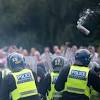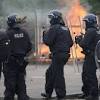What is two-tier policing
2024 - 8 - 6The Great British Policing Debate: Myth, Reality, and Tommy Robinson's Whims!
Chris Hobbs - conspiracy theories - Heidi Alexander - law enforcement - Nigel Farage - public protests - right-wing politics - social media misinformation - Tommy Robinson - two-tier policing - UK riotsIs there really 'two-tier policing' in the UK, or is it just some spicy conspiracy sauce served up by the far-right? Dive into the riot of opinions!
The term 'two-tier policing' has been buzzing around the UK like a wasp at a summer picnic, especially in the wake of riots and protests. It is a concept that suggests there are different standards of law enforcement based upon race, class, or citizenship. Critics, including infamous figure Tommy Robinson, have leveraged this idea during moments of societal unrest, notably during protests that erupted following the fatal shooting of Mark Duggan in 2011 and more recently during Black Lives Matter protests. However, the claim often fails to stand up under scrutiny, with many calling it a mere conspiracy theory.
The far-right has been particularly vocal in pushing the narrative of two-tier policing, depicting it as an exaggerated story of injustice. Yet as Home Secretary Heidi Alexander recently stated after a night of violent protests, "there is no two-tier policing in the UK." This reinforces the notion that such claims often stem more from discontent and political agendas rather than any substantive evidence. With protest numbers increasing, linking violent incidents back to supposed preferential treatment by the police is a convenient way to push narratives, but often lacks any robust back-up once investigated.
Interestingly, the reality is much more complex. Policing decisions are often influenced by a range of contextual factors including potential threats, the nature of the protest, and even historical relationships with communities. Chris Hobbs, an expert in protest dynamics, asserts that while some people may see disparities in enforcement during different protests, it doesn’t indicate a systematic two-tier system. Instead, it reveals the delicate balancing act policing must perform when engaging with various activist groups.
So, does this mean that the idea of two-tier policing is completely unfounded? Well, let’s stir the pot a little! On one hand, there’s the undeniable reality of political fragmentation and heated debates that often accompany protest movements. On the other hand, the notion that policing is operating on two different levels based on race or political affiliation may also be a reflection of deeper societal issues that need addressing. Mood of the country aside, one thing is clear: when it comes to policing, the more we dive into narratives of neglect or preferential treatment, the more we have to peel back the layers of political rhetoric to find the core truths.
Before you close this tab, here are a couple of interesting nuggets about recent protests and policing: did you know that nearly 400 arrests were made during the protests in South Belfast? Also, some protest events have grown to such a scale that social media platforms have labelled them as potential flashpoints for violence, a modern twist in the age of information! The intrigue continues as the UK grapples with its policing strategies and the narratives that surround them. Buckle in, folks, this debate is not over yet!

England riots: how has 'two-tier policing' myth become widespread? (The Guardian)
Idea has been propagated by Tommy Robinson and others from far right but claim does not stand up to scrutiny.

UK riots: What is the meaning of 'two-tier policing' as Nigel Farage ... (The Independent)
Critics and the far right have claimed previous protests - including those in 2011 after the fatal shooting of Mark Duggan and the Black Lives Matters ...

What is the 'two-tier policing' conspiracy theory? (Left Foot Forward)
Baseless rumours and conspiracy theories spread rapidly online in the aftermath of the fatal stabbing of children in Southport last Monday, sparking violent ...

Minister for Courts rejects idea of 'two-tier policing' following another ... (LBC)
Heidi Alexander has rejected the idea of "two-tier policing" following another night of violent protests across the UK.

There is no two-tier policing – this is nothing like the Gaza protests (iNews)
These have involved stones and petrol bombs being thrown in South Belfast, and flares being thrown outside Downing Street. Nearly 400 arrests had been made ...

Two tier policing: myth or fact? (Police Oracle)
Chris Hobbs who has been following significant protests by a range of activist groups since the pandemic, debunks some of the criticisms being aimed at ...
Explore the last week
- 2024 - 12 - 20, 25 topics across 214 articles.
- 2024 - 12 - 19, 23 topics across 278 articles.
- 2024 - 12 - 18, 39 topics across 444 articles.
- 2024 - 12 - 17, 30 topics across 399 articles.
- 2024 - 12 - 16, 20 topics across 210 articles.
- 2024 - 12 - 15, 50 topics across 641 articles.
- 2024 - 12 - 14, 38 topics across 411 articles.